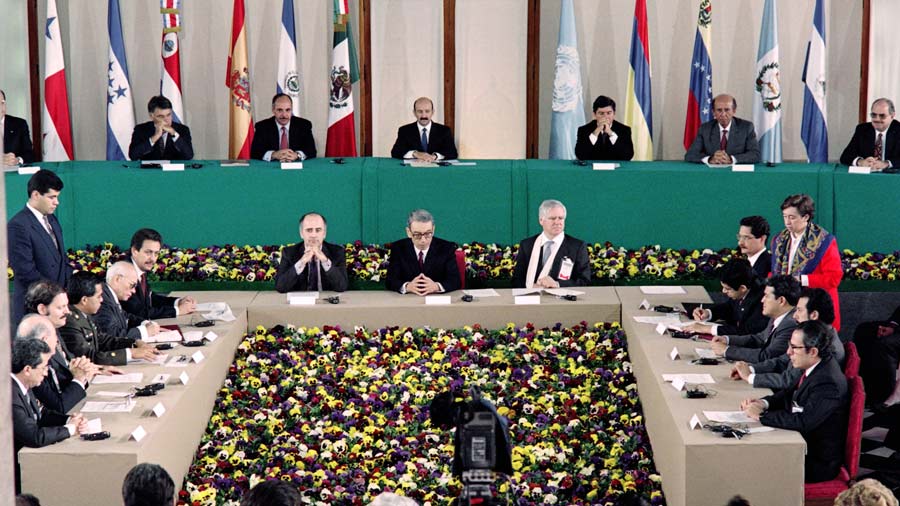
El Diario de Hoy joins the commemoration of the anniversary of one of the most important landmarks that opened the door to building democracy and freedom.
29 years ago, less than a day ago, the silence of the rifles was signed and it is not a small thing. For a country that has suffered repression, political violence, persecution of dissent and where the political and economic system has been designed to avoid significant reforms and to silence the voices of the opposition, turn the page on war and enter the uncertain seas of democracy it is a very important stage.
On January 16, 1992, at Chapultepec Castle in Mexico City, the foundations were laid for a republic in which differences are administered in a peaceful, political, and civilized manner.
Advances and countermeasures
As is natural in any human process, especially one involving a society and its political evolution, not everything has been a steady progress towards greater democracy and freedom.
During this period, in which seven governments of three different party flags and with different visions marched, El Salvador experienced corruption, abuses of power, nepotism and vices of power that mimicked the years before the armed conflict.
Special: faces and voices of conflict
But attributing these vices to peace agreements is an act of historical myopia, ignorance, or complete malice, when they have generated an institutional conspiracy that seeks to prevent and punish these excesses.
Although there have been setbacks in the democracy intended, the foundations laid in the peace agreements have allowed, among other things, these political differences to be no longer resolved in the old fashioned way: the use of repression, kidnappings, torture and disappearances as methods of pressure or tools. daily politics.
The fact that a Salvadoran encounters investigative articles that show indications of corruption in past or current administrations attests to significant progress in the freedom of the press and independent journalism, the fundamental pillars of a democracy and that allow the citizen to know what happens to the money he you pay in taxes.
That a journalist can ask difficult questions and make a government uncomfortable and not disappear after a few days is a sign that the long-awaited signing of peace has served the citizen to be more informed, empowered and able to make better decisions.
The fact that a group of citizens is protesting against what they consider to be a mismanagement of public resources and not facing the heavy boot of repression is a clear sign that in 1992 they said nothing more! to political violence.
The price of oblivion and impunity
The fact that the security forces should submit to civilian power and respect human rights seemed inconceivable three decades ago and today is a negotiable feature.
The fact that the leaders are unattainable is a fundamental achievement of the Peace Accords.
Politics has always outraged the citizen. But before the agreement signed in Chapultepec, the options for organizing and expressing dissatisfaction were limited and very dangerous. An indisputable achievement of peace is the power to respond to the scandal of rulers with discomfort.
Whether with reports and journalism, peaceful protests on various platforms, or the activation of the institutional framework and controls on power, since 1992 Salvadorans can demand that the government be responsible, provide explanations, and show the use of public funds to avoid waste or steal. .
The denial of this progress is therefore either foolish or motivated by perverse claims.
What was peace?
Peace agreements were not the same as handing over a finished country and automatically better and more prosperous than the day before.
What they have allowed is to generate the platforms so that Salvadorans can discuss what kind of country they want to build. He argues, does not dictate or force, much less with the false “eloquence” that comes from having weapons subdued by the leader.
“Peace agreements have not been unnecessary and have not been a farce,” Bukele’s academics and political leaders say.
El Salvador is far from a dream country. Opportunities for significant economic progress are rare. Violence continues to haunt thousands of compatriots every day and force them to move or migrate to hundreds more. Public resources continue to be seen as a bank at the discretion of those who govern.
But these are not problems of signing peace. On the contrary, the progress that has been made, which is numerous and significant, shows that what the country needs is to deepen the path established in 1992 and not to resume the significant democratic process since then.
The signing of peace agreements was not an “end of history”, but the beginning of a construction in which everyone can and should be the protagonists, participating, activating institutions and even making power uncomfortable.
Now, the claim to deny this historical process is very dangerous. Denying the value of the security forces to be professional and apolitical, denying political plurality and claiming that there are “official voices”, silencing the press and opposing the Peace Accords can only respond to the desire to start a “new” story that evokes truly the darkest and most cavernous past of repression and abuses of power.